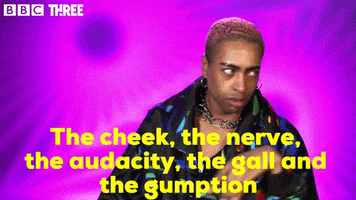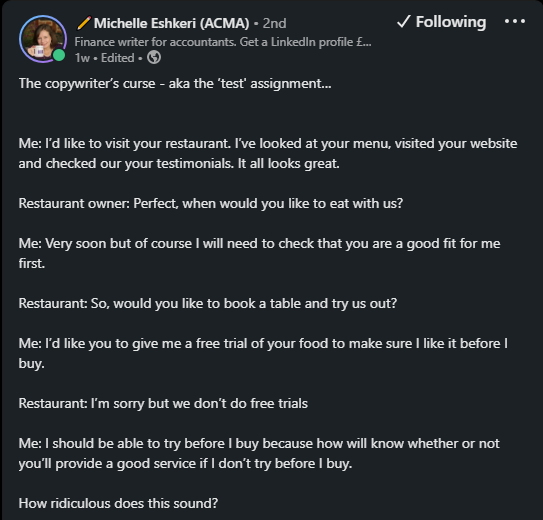Wanna hear a hilarious joke?
I once applied for an opportunity where the person got back to me with this "small pre-work assignment".
The punchline? This person expected me to do it for free. Can you imagine? Complete brand strategy and the content to go along with it — in 3 days and for free.
After I stopped laughing, I got serious and told her I don't offer unpaid work and could instead work on a paid trial assignment with a smaller scope so we could both see if we're a good fit. After all, I'm cautious about my clients just as they are about the folks they hire.
She refused, saying this "small pre-work assignment" was mandatory. I bowed out because I respect my work and the clients who actually pay me to do those things.
But let's back up a second, shall we?
There's so much unpaid labour already, don't add to it
I'm not the first creative, nor will I (unfortunately) be the last one to be asked for free work. Ever since I entered the workforce, I've received requests (which are actually demands) for free labour. It doesn't matter if it was for a prospective freelance client or a full-time job I'd applied for — everyone wants to test my skills and make sure they're not hiring a fake.
Which, you know, is very fair. If I were to subcontract my work, I would want to know if this person can write and isn't just talking their non-existent skills up.
But there's a difference between testing someone's skills and asking for unpaid labour.
There are very few industries that allow people to ask for free work. Even when you want to buy a car and get to test drive it — you don't get to test drive a brand new car. The manufacturer would go broke just churning out cars for everyone who wanted to "test-drive" a new car.
So, why is it different for creative professionals? You get to see my writing samples — client work or personal work (ask for drafts, the thought process, and/or testimonials if you want cold hard proof). But, you don't get to demand a brand new piece — that costs money.
Plus, professions and opportunities that ask for free samples are more often than not creative in nature. This means that there's already a lot of unpaid labour — you can't really time yourself thinking of ideas, for one. It's not like I can set a Pomodoro timer and restrict my brainstorming to just those 25 minutes. I get ideas when I'm doing the dishes or reading a novel — that's all work-related, and I'm happy to do it because I'm being paid fairly for my output.
Asking for unpaid labour = expecting privilege
Whenever brands or companies ask for unpaid labour in the guise of tests, "pre-work assignments", free samples, or whatever, they're ensuring that only privileged people can enter their industry.
If I have to work for free to prove that I'm worth being paid for my work, then who's gonna pay my bills? There's an expectation that there's family, a working spouse, or a different cash cow who can finance creatives while they go around offering free samples to companies.
This effectively means that people who cannot afford to work for free will never be able to enter the industry. If you cannot pay your bills or put food on the table without earning money for your work, it goes without saying that unpaid labour cannot be done.
So now we're keeping hardworking, talented people out of an industry simply because they literally cannot afford to work for free. That's how creative professions end up becoming something only rich or well-off people can do. It's not passion; it's money that's the deciding factor.
The promise of paid work in the future
One word: codswallop.
If I get something for free the first time, there are a few reasons I'd be willing to pay for it the second time. I'll just figure out another way to get it for free again. I did it once; how hard can it be to replicate?
As a freelance writer, I've had to tell myself that if I were to offer a prospect a free blog post, what makes me think they're gonna pay me $300 for the next one? That's a steep 300% increase.
And what's stopping them from going, "we liked your work, but unfortunately, we don't think this a right fit", and then using your article anyway? Whether they use it word or word or pick up your outline, it doesn't matter — the hours you spent on that are wasted and gone forever.
If a company shortlists ten creatives and asks each one to provide a free sample on a different topic, they've got two months' worth of content for free, and they don't even have to hire anyone. Repeat that process every 2-3 months, and you're set for the year.
This is obviously not meant to give any companies the wrong idea, but I know it will, so I'm only talking to the creative professionals who are being asked for free work.
Don't do it.
There are only one or two good reasons to do unpaid labour. One is if it's a non-profit or something that gives back. Please make sure that you've actually gotten something to give back, aka other clients are paying you. Your generosity shouldn't deplete you.
The other reason most people are willing to work for free is a big name affiliation. Which I suppose is great, and I would do it too, but I would question why such a big brand or company doesn't have the money to pay me.
Clearly, if I'm being asked for a sample by them, they've gone deep into my existing work — so why not pay me?
What about all the exposure we're offering?
To quote that viral song,
It costs [...] 'cause I don't have superpowers. You need to pay for my skills 'cause exposure doesn't pay the bills.
But we all know this. This isn't a revolutionary idea; we've all been discussing this for years now. What can people do if they need a foot in the door of an industry built on unpaid labour?
When it comes to testing if someone's legit, you can do it many ways and here are two of my favourites:
A small paid trial assignment. The idea is to offer this to someone after looking at the samples the person provides, checking their skills across whatever social media/portfolio they've got, and seeing the type of work they've done previously. That way, you've got a clear idea of what the person brings to the table, and you can pay them to see it in action.
No money? Offer them something in return. If you do your due diligence when you're shortlisting folks, you can give them bylines, creator credit, or guidance (editing, mentorship, actually valuable feedback). This only applies if you're talking to someone who's just about starting out — just like you are (given the lack of money).
For all my creative professionals being asked for free samples and unpaid labour, I've got you:
Say no, thank you
If you can, please decline and tell them you're open to a paid trial assignment. If you're a freelancer, you run a business. You're providing a service.
If you find that your tap's leaking, you don't go round and ask the plumber to fix it as a trial and that you'll pay him if you like his work. You want that tap fixed? You gotta pay him his wages. Or try to fix it yourself.
Same principle.
Need the business?
Ask for something in return — bylines, editor's feedback, etc. You know what's valuable in your industry. Ask for credit at the bare minimum and reserve the intellectual property of your piece — they cannot use it publicly unless they pay you.
It's a two-way street. No money, no work — because you've got to put your foot down at some point.
If you want to get into the professional freelance game, you have to start thinking of yourself as a professional. Because you are. There’s a huge difference between a low-paying client and one who doesn’t pay at all: the low-paying client at least respects your work and effort. And, you can raise your rates later.
Finally, @ Companies, stop asking for unpaid labour
It's too much to ask for, but we've gotta start somewhere, so: companies, please stop asking for free samples. Instead, do your due diligence and shortlist only enough folks that you can pay for trial assignments.
No one's gonna be able to capture your brand's tone and style in one free blog post, so don't kid yourself or the other person.
Respect people's time, effort, and skills.
What did you think about this issue?
Your anonymous feedback helps me improve. TIA!
Cross promos to help you find some other cool newsletters!
My friend Ellen Kate Boyle, a freelance copywriter herself, writes Conversations by the Sea — a weekly newsletter about complicated questions and even more convoluted answers.
Two of my recent favourite issues were: How to stay informed without going mad & Has social media killed nuanced debate?
Check it out and subscribe below!
Your list of stuff to check out this week! 💌
There's a lot of stuff going on in the world, and we're all stretched thin in terms of attention and resources we can give. But, if you have the bandwidth, here's info about Sri Lanka's economic crisis and ways to help.
Want more bookish newsletters to read? Books on GIF curated ten of the best ones out there (and included me too!)
It's always UK Top 40 this or US Billboard that. Which songs are trending in the rest of the world?
I love my cotton tote bags (and keep getting new ones) but never realized that it takes 20,000 uses PER TOTEBAG to offset its overall production cost. WTF?
Taking a 5 min break? This tab will make sure it's actually only five minutes. It self-destructs when the time is up.
Finally, here's something wholesome to give you some hope for the week and the world:
Thanks for reading! Don’t forget to hit like and share this issue if you enjoyed it. 🖤
I’ll see you next week — maybe not at the same time, but definitely the same place.











OOF. A big red flag I encountered in my freelance life: asking me to pitch “at least ten topics” and then they’d pick one for me to write... but then how do I know that doesn’t end up being their content next week? I hate it.